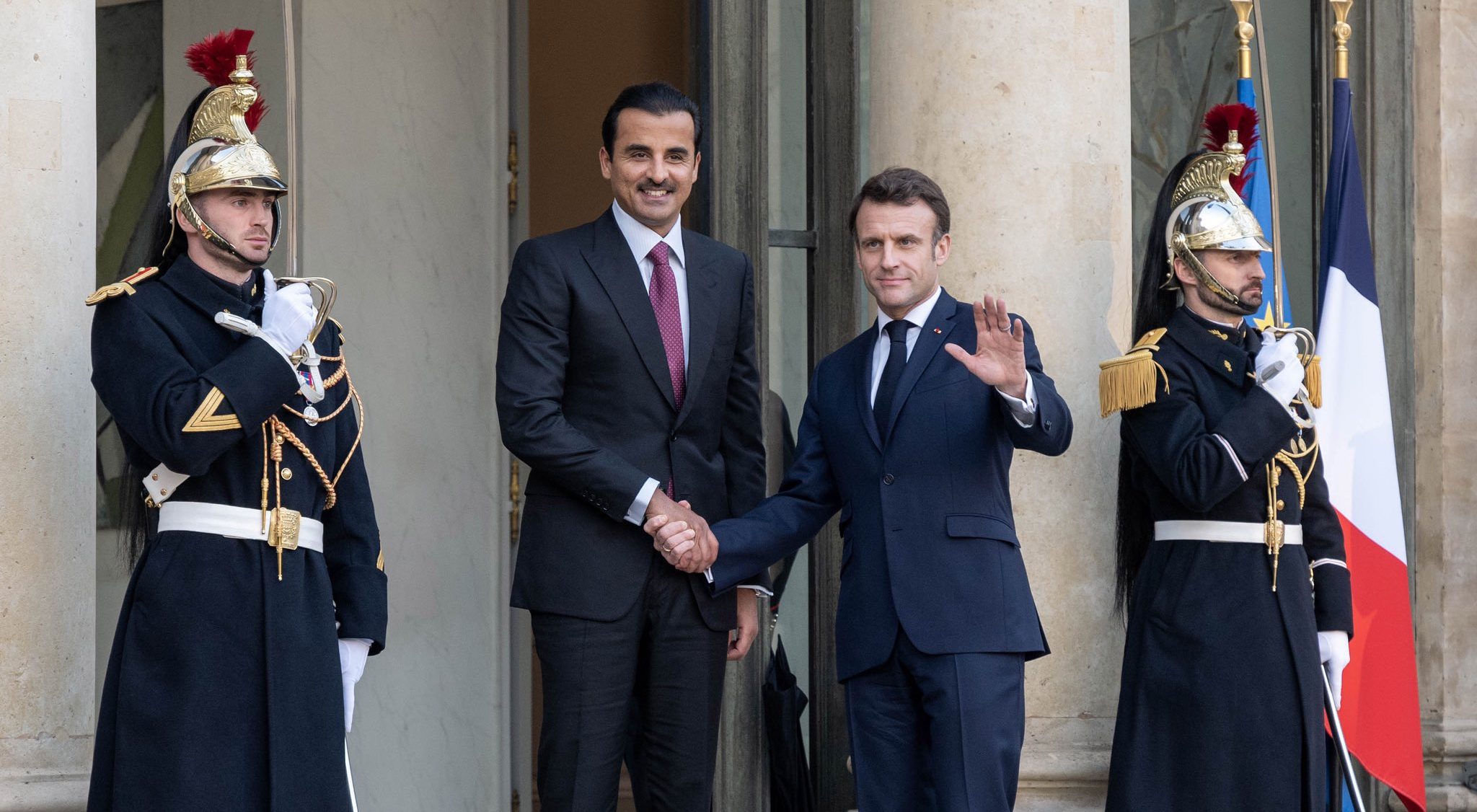The amir was also spotted on Tuesday at the Paris Saint-Germain Bayern Munich game.
Qatar’s Amir Sheikh Tamim bin Hamad Al Thani met with French President Emmanuel Macron in Paris on Wednesday during an official visit to the European nation.
The amir’s visit came just days after a stop in Rome and Istanbul, shortly after the deadly twin earthquakes that struck Turkey and Syria.
“We have close strategic relations with France that are constantly growing thanks to our common desire to support and strengthen them in various fields for the benefit of our two countries, and our visit today to France is the best proof of that,” the Qatari leader said in a tweet.
According to Qatar’s state news agency (QNA), a key issue on the agenda included relief efforts in Turkey and Syria, with both leaders discussing ways to provide support for the affected areas.
Speaking to QNA, Qatar’s Ambassador to France Sheikh Ali bin Jassim Al-Thani noted that the amir’s “working visit” is a reflection of the two countries’ strong relations.
The Qatari envoy pointed to France’s security support during the 2022 FIFA World Cup opening “future prospects for cooperation between the two countries in many areas”, QNA reported.
Macron paid a visit to Qatar for the final match in December, in which Argentina triumphed over France 4-2 on penalties, clinching its third World Cup trophy.
The amir was also spotted on Tuesday at the Paris Saint-Germain Bayern Munich game, which saw the German team beat the Parsians at 1-0.
Qatar had acquired a 70% stake in PSG in 2011 before buying the remaining 30% in 2012 at a reported value of $131.15 million.
Issues of concern
Although no further details were disclosed, the meeting came as Doha and Paris continue to engage in issues of common concern.
Most notably, Lebanon’s multi-faceted crisis has been a key file in recent years with both nations currently taking part in a meeting in Paris to push for a roadmap to see Beirut through its worst economic crisis in decades.
Representatives from Qatar, Saudi Arabia, Egypt, the United States, and France attended a meeting in Paris in a bid to break Lebanon’s years-long deadlock.
On Monday, Lebanese Caretaker Prime Minister Najib Mikati met with the ambassadors of the five countries. During the meeting, the envoys said that no final statement has been issued since the meetings remain “open and ongoing”.
Meanwhile, efforts over the revival of the 2015 nuclear deal, formally known as the Joint Comprehensive Plan of Action (JCPOA), is another issue concerning Doha and Paris.
Talks aimed at restoring the accord were launched in 2021 in Vienna with the participation of the p4+1— France, Russia, the United Kingdom, China, plus Germany.
However, the United States and Iran have yet to reach a deal despite hopeful statements that emerged late last year, pointing to parties nearing an agreement. Talks have also stalled amid ongoing tensions between both countries.
Qatar, which has long called for the restoration of the JCPOA, had also hosted a round of talks last year that yielded no results.
More recently, Qatar has appeared to increase its efforts in breaking the latest stalemate in talks by holding numerous discussions with the US and Iran.
Last month, Qatar’s Foreign Minister Sheikh Mohammed bin Abdulrahman Al Thani met with his Iranian counterpart Hossein Amir-Abdollahian in Tehran, where the former delivered a message from parties involved in the nuclear talks.
Qatar-France ties
Amir Tamim had paid a similar working visit to Paris in May last year as part of a Europe tour as countries in the region scrambled to secure energy supply in light of Russia’s invasion of Ukraine.
The region had previously received 40% of its gas supplies from Russia, with almost a third of shipments passing through Ukraine.
France was among a number of countries that turned to Qatar in an effort to reduce its dependency on Russian gas.
Paris’s purchase of 12.4 billion cubic meters of Russian gas from Gazprom in 2020 made up roughly 29% of its consumption during the same year.
Several agreements were also signed last year between QatarEnergy and France’s TotalEnergies over Doha’s multi-billion North Field expansion project.
The project, the biggest of its kind, is broken into two parts, the North Field East (NFE) and the North Field South (NFS).
The first is set to ramp up Qatar’s production from 77 to 110 million tonnes per annum as the NFS will increase the production capacity from 110 to 126 million tonnes per annum.
France’s economy minister Bruno Le Maire was also in Doha last month, where he met with Qatar’s Minister of Finance Ali Al Kuwari.
A roadmap with areas and specific projects of interest were discussed and established between France and Qatar then, with a focus on innovation in digital and emerging technologies in line with both countries’ 2030 national visions.







